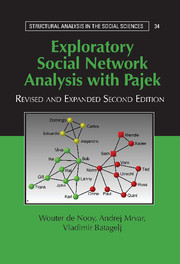Book contents
- Frontmatter
- Contents
- Figures
- Tables
- Preface to the Second Edition
- Preface to the First Edition
- Part I Fundamentals
- Part II Cohesion
- Part III Brokerage
- Part IV Ranking
- 9 Prestige
- 10 Ranking
- 11 Genealogies and Citations
- Part V Roles
- Appendix 1 Getting Started with Pajek
- Appendix 2 Exporting Visualizations
- Appendix 3 Shortcut Key Combinations
- Glossary
- Index of Pajek and R Commands
- Subject Index
9 - Prestige
from Part IV - Ranking
Published online by Cambridge University Press: 05 June 2012
- Frontmatter
- Contents
- Figures
- Tables
- Preface to the Second Edition
- Preface to the First Edition
- Part I Fundamentals
- Part II Cohesion
- Part III Brokerage
- Part IV Ranking
- 9 Prestige
- 10 Ranking
- 11 Genealogies and Citations
- Part V Roles
- Appendix 1 Getting Started with Pajek
- Appendix 2 Exporting Visualizations
- Appendix 3 Shortcut Key Combinations
- Glossary
- Index of Pajek and R Commands
- Subject Index
Summary
Introduction
In directed networks, people who receive many positive choices are considered to be prestigious. Prestige becomes salient especially if positive choices are not reciprocated; for instance, if everybody likes to play with the most popular girl or boy in a group but he or she does not play with all of them or, in the case of sentiments, if people tend to express positive sentiments toward prestigious persons but receive negative sentiments in return. In these cases, social prestige is connected to social power and the privilege of not having to reciprocate choices.
In social network analysis, prestige is conceptualized as a particular pattern of social ties. We discuss techniques to calculate the structural prestige of a person from his or her social ties, notably sociometric choices. We do not compute a prestige score for an entire network.
Structural prestige is not identical to the concept of social prestige in the social sciences or in ordinary speech. For example, the medical profession is thought to be prestigious, but it is difficult to consider professions as a network in which many arcs point toward the medical profession. The prestige of an art museum may depend on the value and origins of its collection rather than on the number of art works it attracts (receives) from other museums. However, social prestige is probably related to structural prestige. In community studies, for example, a physician is more often nominated in advice-seeking relations than members of many other professions, and a prestigious art museum receives more attention from art critics than less prestigious ones.
- Type
- Chapter
- Information
- Exploratory Social Network Analysis with Pajek , pp. 215 - 233Publisher: Cambridge University PressPrint publication year: 2011



